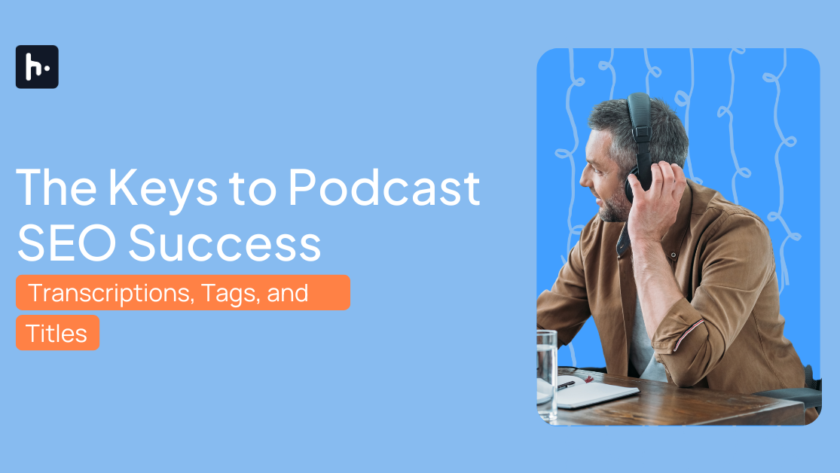How do you create a successful podcast? With over 70 million Americans tuning into podcasts, the podcasting space is booming. Is there an effective strategy to ensure your podcast reaches this audience? Yes, and the answer is podcast SEO. When you optimize transcriptions, link building, tags, the podcast and episode title and description, you can start appearing in front of your audience when they search for your podcast and increase your listenership. Done right over time, you will first hand see compounding results and soon your podcast can be topping the charts.
So, how do you actually implement all of this? In this blog we’ll discuss all of that and more.
The Power of Podcast Transcriptions
What Are Podcast Transcriptions?
Think of your episode’s transcriptions as the text version of your audio. They were introduced to make podcasts accessible to people who are deaf or have hearing problems. Insights from GoTranscript emphasize the significant role of audio transcription in improving content accessibility.
Apart from just making your podcast more accessible to people with hearing impairments, you also make your podcast accessible to non native speakers or people consuming your content in noisy environments.
For non-profits, making their podcast accessible helps them align with accessibility laws too.
Inadvertently, there are podcast SEO benefits. How?
Search engines can’t crawl audio files, however they do crawl your RSS feed. With your transcription in your RSS feed, it becomes easier for search engines like Google and podcast directories like Spotify and Apple Podcasts to understand your podcast better and show it to your target audience.
Real-Life Example
A research by Amberscript showed how HubSpot increased their visibility by simply tweaking one thing. They added transcriptions to their videos, which helped Google understand their content better and thus improved the videos’ visibility in the search results.
Tags – The Hidden Tool to Boost your Podcast SEO
What Are Tags and How Do They Work?
We all have nicknames right? Think of tags as nicknames for your podcast. Short keywords or phrases that explain broadly what your podcast or episode is about. It nt only helps your audience understand what your podcast is about but also help search engines to make sense of your podcast. There are three types of tags:
- Episode-specific (e.g., “how to start a business,” “freelance tips”)
- Category-specific (e.g., “entrepreneurship,” “marketing”)
- Keyword-based tags (e.g., “SEO for beginners,” “social media strategy”)
How to use Tags to Boost Podcast SEO?
First, identify the right tags for your podcast. How would you describe your podcast in a few phrases based on your category? Note them down. How would you describe your episodes in a few phrases? Note them down too.
Next, refine or find more terms that are both relevant to your episode and commonly searched by your target audience. Tools like Google Trends and keyword research platforms (Semrush, Ahrefs, and TubeBuddy) can help you identify such tags.
Now, sprinkle these tags in your podcast and episode descriptions. Don’t go overboard, just mentioning it once or twice does the trick. If you have a podcast website, use these tags in the content of the website as well, so your website also starts ranking in search engines when people search for these tags.
This research into podcast visibility shows that the practice of tagging can improve your podcasts’ visibility in search engines.
Coming Up With A Podcast and Episode Title
Why are your podcast and episode titles so important?
Your podcast title is the first impression on your listeners. Not only that, it is also what search engines look at when they’re trying to understand your content and make it visible to your audience.
How to optimize your titles for podcast SEO and your audience?
To optimize your podcast titles, consider these tips:
- Include High-Ranking Keywords
- Be Clear and Concise
- Be Specific and address your listeners’ pain points and problems
Statistics: According to a report from Auddy: When optimizing podcast titles for SEO, the above three things can make a significant impact on visibility and engagement.
Real-Life Example
The Tim Ferris Show improved their episode titles and got a 20% increase in downloads. So what did they do? They switched from generic titles like “Episode 345” to more descriptive titles such as “How to Optimize Your Productivity with Tim Ferriss.”
Link Building – The Last Link to strengthen Your Podcast SEO
Why Link Building Is Crucial for Podcast SEO
Think of link building as a referral. When your friend recommends you to buy a phone, you seriously consider their opinion. Similarly, search engines also look at different websites and see how many have “linked” a particular website. The more websites that have linked it, the better.
How can this help your podcast? When other websites link to your podcast, it helps increase your rankings in search results, making it easier for new listeners to find your content.
How can you build links for your podcast?
- Reach Out to relevant Blogs and Websites to request backlinks.
- Offer posting some content on blogs and websites in exchange for a backlink.
- Leverage Podcast Directories like Podchaser and Listen Notes
- Collaborate with Other Podcasters and ask for a backlink
Statistics: A study by Backlinko found that websites with quality backlinks experience up to 50-100% more organic traffic. It is a clear indication that backlinking works.
Tools and Automations for Link Building
Lets be honest, link-building is a time-consuming process. That’s where automation tools can help you save time. Linkee is an automated backlinking tool that makes it easier for you to build backlinks without manually reaching out to websites. With automated tools, focus on creating awesome podcasts and episodes while the tool handles all the boring and time consuming tasks of backlinking with only minimal involvement.
Conclusion
The podcast space is booming and to make your mark you don’t need just good content, you need an extra edge to stand out. Podcast SEO can be that tool. With the strategies discussed, you can reach a wider set of audience and see your downloads soar.





